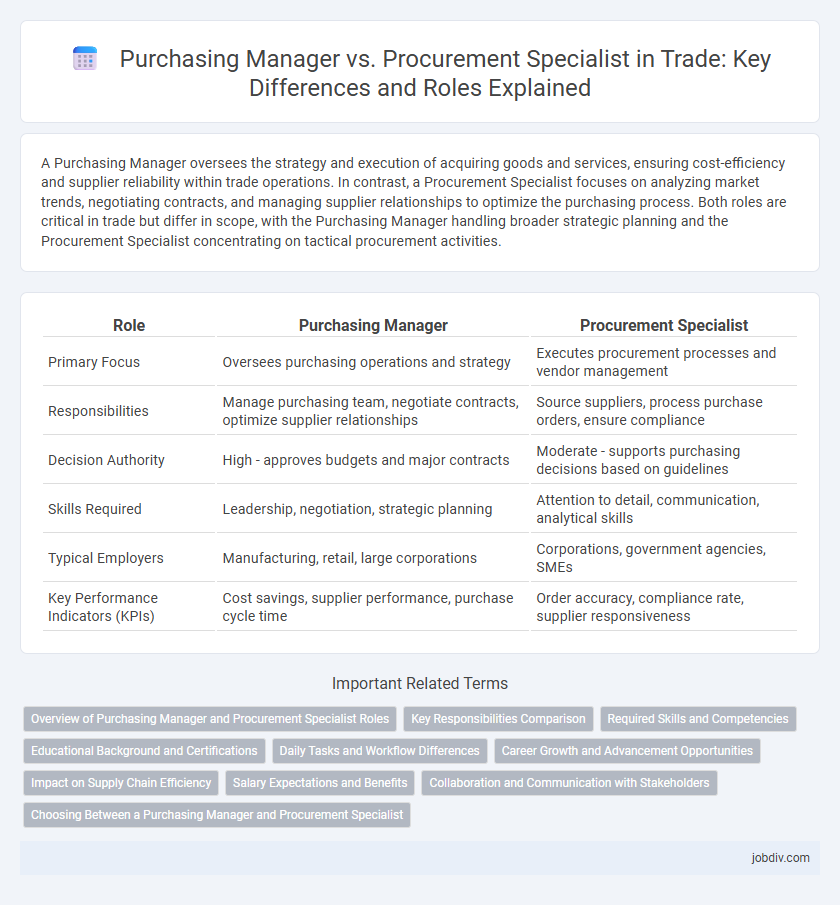A Purchasing Manager oversees the strategy and execution of acquiring goods and services, ensuring cost-efficiency and supplier reliability within trade operations. In contrast, a Procurement Specialist focuses on analyzing market trends, negotiating contracts, and managing supplier relationships to optimize the purchasing process. Both roles are critical in trade but differ in scope, with the Purchasing Manager handling broader strategic planning and the Procurement Specialist concentrating on tactical procurement activities.
Table of Comparison
| Role | Purchasing Manager | Procurement Specialist |
|---|---|---|
| Primary Focus | Oversees purchasing operations and strategy | Executes procurement processes and vendor management |
| Responsibilities | Manage purchasing team, negotiate contracts, optimize supplier relationships | Source suppliers, process purchase orders, ensure compliance |
| Decision Authority | High - approves budgets and major contracts | Moderate - supports purchasing decisions based on guidelines |
| Skills Required | Leadership, negotiation, strategic planning | Attention to detail, communication, analytical skills |
| Typical Employers | Manufacturing, retail, large corporations | Corporations, government agencies, SMEs |
| Key Performance Indicators (KPIs) | Cost savings, supplier performance, purchase cycle time | Order accuracy, compliance rate, supplier responsiveness |
Overview of Purchasing Manager and Procurement Specialist Roles
Purchasing Managers oversee the acquisition of goods and services, managing supplier relationships, negotiating contracts, and ensuring cost efficiency to meet organizational needs. Procurement Specialists focus on sourcing vendors, evaluating supplier performance, and executing purchase orders to align with company procurement policies. Both roles are essential in streamlining the supply chain and optimizing operational costs within trade environments.
Key Responsibilities Comparison
Purchasing Managers primarily focus on negotiating contracts, managing supplier relationships, and overseeing the acquisition process to ensure cost-effective procurement. Procurement Specialists specialize in market analysis, vendor evaluation, and ensuring compliance with procurement policies while facilitating the purchasing cycle. Both roles collaborate to optimize supply chain efficiency, but Purchasing Managers emphasize strategic supplier management whereas Procurement Specialists handle operational procurement tasks.
Required Skills and Competencies
Purchasing Managers require strong leadership, negotiation, and strategic planning skills to manage supplier relationships and oversee procurement processes effectively. Procurement Specialists must possess in-depth knowledge of market analysis, contract management, and compliance with purchasing policies to ensure cost efficiency and quality control. Both roles demand excellent communication, analytical abilities, and proficiency in supply chain management software.
Educational Background and Certifications
Purchasing Managers typically hold a bachelor's degree in business administration, supply chain management, or a related field, often complemented by certifications such as the Certified Professional in Supply Management (CPSM) or Certified Supply Chain Professional (CSCP). Procurement Specialists usually possess a degree in business, finance, or logistics, with industry-specific certifications like the Certified Purchasing Professional (CPP) or the Certified Procurement Specialist (CPS) enhancing their expertise. Both roles benefit significantly from continuous professional development and relevant certifications to stay updated with trade regulations and procurement best practices.
Daily Tasks and Workflow Differences
Purchasing Managers oversee supplier negotiations, contract approvals, and strategic procurement planning, ensuring alignment with company goals while managing a team. Procurement Specialists focus on executing purchase orders, supplier communication, and monitoring inventory levels for timely delivery. The workflow of Purchasing Managers is strategic and decision-oriented, whereas Procurement Specialists handle operational, transactional tasks essential for daily purchasing functions.
Career Growth and Advancement Opportunities
Purchasing Managers typically oversee strategic sourcing and supplier relationships, offering broader leadership roles that lead to senior management positions such as Supply Chain Director. Procurement Specialists often concentrate on operational tasks like purchase order processing and supplier evaluation, providing a strong foundation for specialization in areas like contract management or compliance. Career growth in purchasing management usually involves greater responsibility for budget decisions and team leadership, while procurement specialists may advance through acquiring certifications and expertise in niche categories.
Impact on Supply Chain Efficiency
A Purchasing Manager directs the acquisition of goods and services, emphasizing cost savings and supplier relationships to streamline order fulfillment and reduce lead times. Procurement Specialists execute strategic sourcing and contract negotiations, ensuring compliance and quality standards that enhance supply chain reliability. Their combined roles optimize inventory management, minimize disruptions, and drive overall supply chain efficiency.
Salary Expectations and Benefits
Purchasing Managers typically earn higher salaries than Procurement Specialists, with average annual pay ranging from $75,000 to $110,000 depending on industry and experience, while Procurement Specialists generally earn between $55,000 and $85,000. Benefits for Purchasing Managers often include performance bonuses, stock options, and extensive health coverage, reflecting their strategic role in supply chain management. Procurement Specialists usually receive standard benefits such as health insurance, retirement plans, and professional development opportunities focused on cost-saving techniques and supplier relations.
Collaboration and Communication with Stakeholders
Purchasing Managers coordinate closely with suppliers and internal teams to ensure timely acquisition of goods, emphasizing clear communication to align procurement strategies with business objectives. Procurement Specialists engage with stakeholders by analyzing needs and negotiating contracts, fostering collaborative relationships that optimize supply chain efficiency. Both roles require effective dialogue and teamwork to drive cost savings and maintain strong supplier partnerships in dynamic trade environments.
Choosing Between a Purchasing Manager and Procurement Specialist
Choosing between a Purchasing Manager and a Procurement Specialist depends on the scope and complexity of the organization's supply chain needs. A Purchasing Manager typically oversees buying strategies, supplier relationships, and team management, ensuring efficient acquisition processes across various categories. In contrast, a Procurement Specialist focuses on specific procurement tasks such as vendor evaluation, contract negotiation, and compliance, offering detailed expertise in sourcing and purchasing functions.
Purchasing Manager vs Procurement Specialist Infographic

 jobdiv.com
jobdiv.com